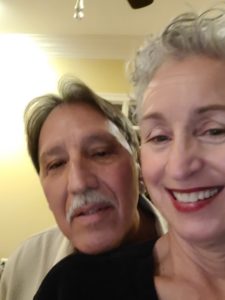
The comprehensive group of caregivers at Mary Bird Perkins – Our Lady of the Lake Cancer Center never allowed Charles to believe he could be anything but a survivor. His team of doctors quickly laid out a plan. With Maria by his side, Charles followed a schedule of appointments, meeting with Dr. Daniel LaVie, medical oncology, Dr. Kos Kovtun, radiation oncology and Dr. Keith Rhynes, general surgery. This team worked collaboratively to ensure the best treatment plan for Charles’ diagnosis including chemotherapy, radiation therapy and surgery. With the radiation focused close to Charles’ lungs and heart, he and Maria were worried about the potential for damage to these key organs. However, they complimented Dr. Kovtun’s precise planning, along with the honesty and focus of his team throughout the process. “Dr. Kovtun checked my history and said, ‘This is something we can take care of, and I’m going to help you,’” Charles recalled. “He genuinely wanted to make sure I got through it.”
Maria and Charles expressed a tremendous appreciation for every doctor and team member they met with and the level of caring and honesty they received. “Dr. LaVie did such a wonderful job in preparing us,” Maria said. “He was descriptive and truthful about everything. He told us what we could expect but never overwhelmed us.”
After ringing the bell at his completion of chemotherapy and radiation therapy, Charles was able to rest for several weeks before his surgery: Robotic Ivor Lewis Esophagectomy. During this procedure, the cancerous area of the esophagus is removed, and the stomach is then pulled up into the chest and connected to the remaining esophagus. The option of robotic surgery can be of great benefit to cancer patients. “A robotic procedure provides the ability to reach difficult areas with less invasive techniques,” said Dr. Rhynes. “The incisions are smaller and less painful, leading to a quicker recovery.” Without the robotic option, Charles would have been left with larger incisions as well as a lengthier recovery time.
While the procedure is performed utilizing the robot with the help of small instruments and a 3D camera, the surgeon remains in control of the entire process and specific movements. Dr. Rhynes stressed the advantage of robotic surgery and the difference for Charles’ recovery, saying, “It’s a better and more precise cancer surgery option.”
Charles is now recovering and excited to get back to normal activities, including visiting with his two-year-old granddaughter. He and Maria are grateful for the Cancer Center team and encourage others to be mindful of their health and find strength in a support system of loved ones.
“This is a story people need to know,” Maria said. “The team at Mary Bird Perkins – Our Lady of the Lake Cancer Center wrapped their arms around us and made sure we got to exactly where we needed to be at exactly the right minute. They did it all with true empathy, and we felt well cared for.”
